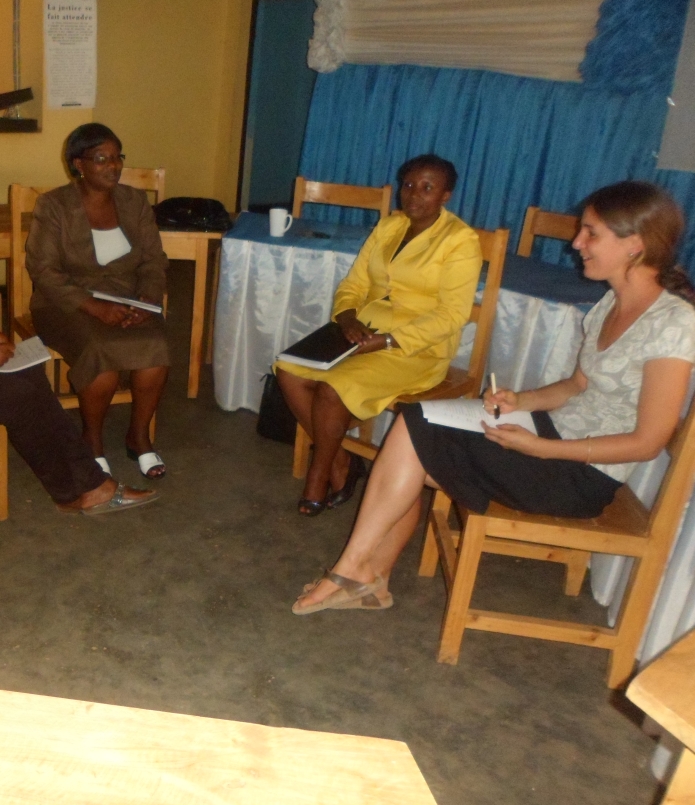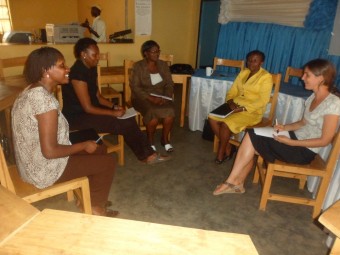
A guest post by Dr Jemma Hogwood, Clinical Psychologist, SURF Rwanda:
For the last 6 months, four groups of women have been meeting regularly in their local communities to discuss their experiences of being raped during the genocide and bringing up children born from rape. Facilitated by a counsellor, the community counselling groups were the idea of the women themselves, who asked Foundation Rwanda for support around talking to their child about their birth and helping them build better relationships with their child.

The groups pray together, learn about important topics, discuss their challenges, listen and support each other and try out relaxation exercises. They started learning about trauma and trauma symptoms which for many of the women, was the first time they recognised why they were feeling the way they did and gave them a chance to tell their story in the presence of other women who shared a similar experience. This in itself is therapeutic and one woman told us:
“I always thought that I was the only one suffering from having a child that was born out of rape but after our group discussion, I got to know that it is no longer my concern as an individual but our concern as a group. Sharing our experiences gave me more hope and strength”
When asked what they had learned from the groups, one lady laughed and began to recount her experiences of receiving a small loan from AVEGA. She said that at the time she was still traumatised and despite AVEGA teaching her about money management she went straight home to her son and said ‘quick, quick, we must spend it all before the killers come back and kill us’. She laughs again and says that she now knows what AVEGA was trying to teach her, but the trauma had gotten in the way. She thinks it should be essential for all women to receive some training and counselling around trauma before starting small businesses.
The counselling groups then went on to discuss the responsibilities of being a parent, how they can try to resolve conflicts between them and their child, the rights of a child and understanding the challenges of adolescence. This was also enlightening to many women with one mother confessing that she thought her son had been poisoned and that this was why he was behaving so strangely, but now she realises it is the normal process of adolescent changes. One group were discussing conflict within the community and within families when one member said ‘I also have conflict, a conflict with my own body as a result of the rape. I think our children also have conflict, a conflict inside themselves because of their identity’. These discussions have led on to talk about the importance for their child to know about the circumstances around their birth. Some mothers had already begun these difficult conversations, but others had not. Of those, many wanted to but found it too difficult.
These important but difficult conversations have been beneficial to the mothers in improving their own well being; ‘We are happy to have this group. We finally have a place where we can share our experiences and emotions. Discussing in the group helps us to the release our pain’. And the groups also impact on the relationships with their child. Talking to some of their children who attend a nearby local school, they have noticed a difference in their mothers since they started meeting for group counselling. One child said that before, her mother would be aggressive towards her when she came home from school, but now they take time to talk and get on better.
Many of the mothers have not fully disclosed to their child the nature of their birth, despite many of the children asking questions and wanting to know who their ‘father’ is. Many of the young people are at risk of hearing rumours, or being told by neighbours or other family members. Foundation Rwanda does not actively encourage the women to disclose, but gives them the opportunity to consider it and discuss the advantages and disadvantages and for them to make a decision based on what is best for each individual and their child. As the groups progress, many of the mothers are naturally beginning to realise that talking to their children is an important next step as they become young adults. The mothers are getting support and encouragement from the group, listening to those who have already started those conversations and considering whether the time has come for them to also begin.
